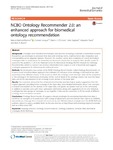Mostrar o rexistro simple do ítem
NCBO Ontology Recommender 2.0: an enhanced approach for biomedical ontology recommendation
| dc.contributor.author | Martínez-Romero, Marcos | |
| dc.contributor.author | Jonquet, Clement | |
| dc.contributor.author | O'Connor, Martin J. | |
| dc.contributor.author | Graybeal, John | |
| dc.contributor.author | Pazos, A. | |
| dc.contributor.author | Musen, Mark A. | |
| dc.date.accessioned | 2019-03-29T12:26:26Z | |
| dc.date.available | 2019-03-29T12:26:26Z | |
| dc.date.issued | 2017-06-07 | |
| dc.identifier.citation | Martínez-Romero M, Jonquet C, O'Connor MJ, et al. NCBO Ontology Recommender 2.0: an enhanced approach for biomedical ontology recommendation. J Biomed Semantics. 2017; 8: 21 | es_ES |
| dc.identifier.issn | 2041-1480 | |
| dc.identifier.uri | http://hdl.handle.net/2183/22429 | |
| dc.description.abstract | [Abstract] Background. Ontologies and controlled terminologies have become increasingly important in biomedical research. Researchers use ontologies to annotate their data with ontology terms, enabling better data integration and interoperability across disparate datasets. However, the number, variety and complexity of current biomedical ontologies make it cumbersome for researchers to determine which ones to reuse for their specific needs. To overcome this problem, in 2010 the National Center for Biomedical Ontology (NCBO) released the Ontology Recommender, which is a service that receives a biomedical text corpus or a list of keywords and suggests ontologies appropriate for referencing the indicated terms. Methods. We developed a new version of the NCBO Ontology Recommender. Called Ontology Recommender 2.0, it uses a novel recommendation approach that evaluates the relevance of an ontology to biomedical text data according to four different criteria: (1) the extent to which the ontology covers the input data; (2) the acceptance of the ontology in the biomedical community; (3) the level of detail of the ontology classes that cover the input data; and (4) the specialization of the ontology to the domain of the input data. Results. Our evaluation shows that the enhanced recommender provides higher quality suggestions than the original approach, providing better coverage of the input data, more detailed information about their concepts, increased specialization for the domain of the input data, and greater acceptance and use in the community. In addition, it provides users with more explanatory information, along with suggestions of not only individual ontologies but also groups of ontologies to use together. It also can be customized to fit the needs of different ontology recommendation scenarios. Conclusions. Ontology Recommender 2.0 suggests relevant ontologies for annotating biomedical text data. It combines the strengths of its predecessor with a range of adjustments and new features that improve its reliability and usefulness. Ontology Recommender 2.0 recommends over 500 biomedical ontologies from the NCBO BioPortal platform, where it is openly available (both via the user interface at http://bioportal.bioontology.org/recommender, and via a Web service API). | es_ES |
| dc.description.sponsorship | National Institutes of Health (United States); U54 HG004028 | es_ES |
| dc.description.sponsorship | Center for Expanded Data Annotationand Retrieval (CEDAR); U54 AI11792 | es_ES |
| dc.description.sponsorship | Agence nationale de la recherche (France); NR-12-JS02-01001 | es_ES |
| dc.language.iso | eng | es_ES |
| dc.publisher | BioMed Central | es_ES |
| dc.relation.uri | https://doi.org/10.1186/s13326-017-0128-y | es_ES |
| dc.rights | Atribución 3.0 España | es_ES |
| dc.rights.uri | http://creativecommons.org/licenses/by/3.0/es/ | * |
| dc.subject | Ontology selection | es_ES |
| dc.subject | Ontology recommendation | es_ES |
| dc.subject | Ontology evaluation | es_ES |
| dc.subject | Semantic web | es_ES |
| dc.subject | Biomedical ontologies | es_ES |
| dc.subject | NCBO BioPortal | es_ES |
| dc.title | NCBO Ontology Recommender 2.0: an enhanced approach for biomedical ontology recommendation | es_ES |
| dc.type | info:eu-repo/semantics/article | es_ES |
| dc.rights.access | info:eu-repo/semantics/openAccess | es_ES |
| UDC.journalTitle | Journal of Biomedical Semantics | es_ES |
| UDC.volume | 8 | es_ES |
Ficheiros no ítem
Este ítem aparece na(s) seguinte(s) colección(s)
-
GI-RNASA - Artigos [192]








